Blogs Inside The Open Source Softwares (OSS) PRs Massacre of GitHub
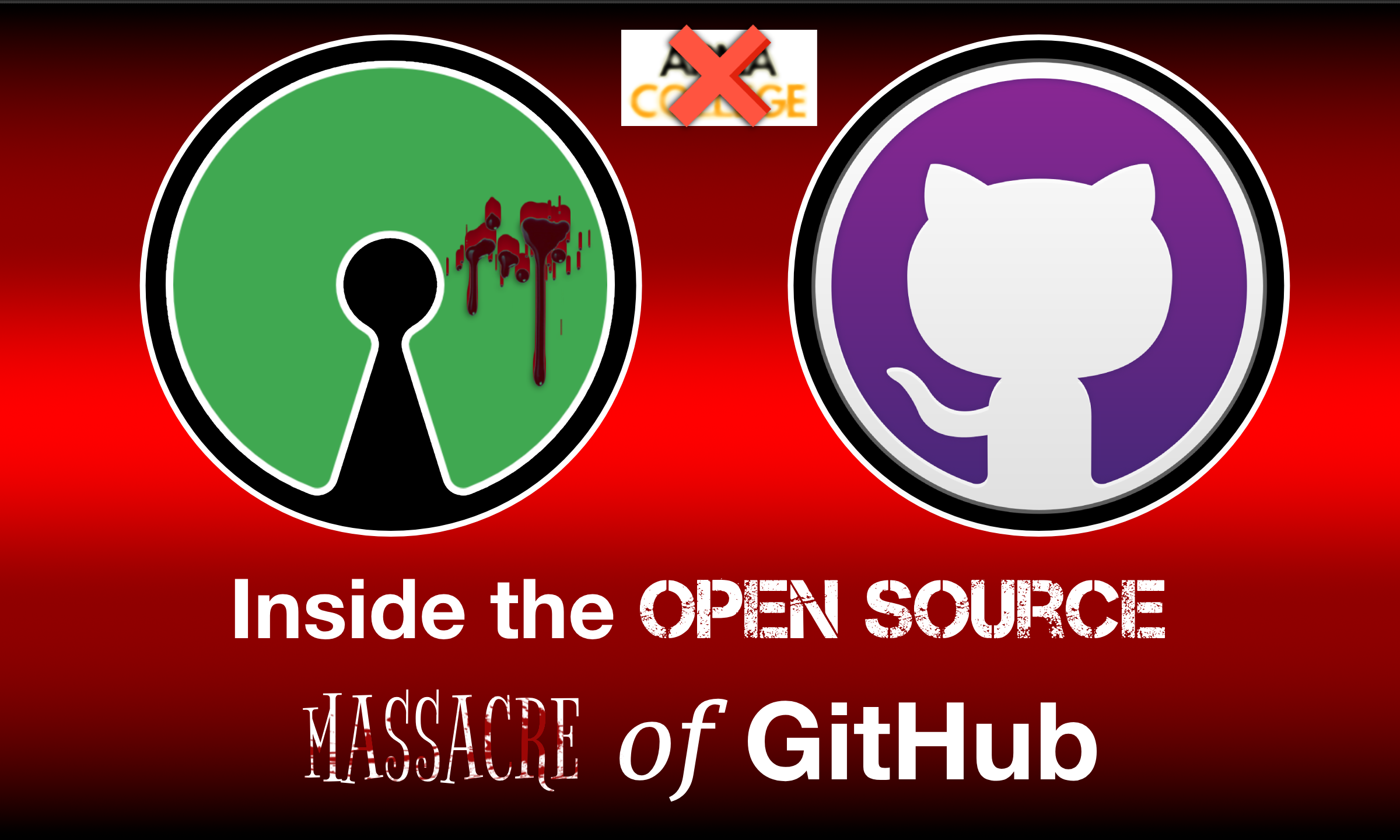
10th November, 2025
Inside The Open Source Softwares (OSS) PRs Massacre of GitHub
A deep dive into how a single 5.6M view tutorial sparked years of README.md spam on GitHub, the real impact on Open Source Software (OSS) maintainers and Indian developers, and why "we assume some missed this part :)" might be the worst response to legitimate criticism. This isn't just about annoying Pull Requests (PRs) but it's also about educational responsibility, career desperation, and the damage done when content creators prioritize views over consequences.
Introduction
Listen, we need to talk. Not the "we need to talk" that your manager sends at 5 PM on a Friday, but the kind that your well-meaning uncle gives you when you're about to make a spectacularly bad life decision like getting a neck tattoo or, I don't know, adding your name to Express.JS's README.md file.
Crime Scene
Picture this: You're a maintainer of Express.JS, a framework so foundational that it's probably running the website you're panic-applying to jobs on right now. You wake up, grab your coffee, and open GitHub to find 47 new pull requests. Your heart sinks. Not because there's a critical security vulnerability, not because someone found a memory leak, but because 22.8% of your open PRs are just people adding their names to a text file. It's like being a Michelin star chef and having your kitchen flooded with delivery orders for plain toast. With no butter. Not even toasted properly.
Don't believe the scale of this disaster? Let me show you what Express.js maintainers wake up to every single day. These aren't cherry-picked examples. This is just a random Tuesday morning on one of the most critical JavaScript frameworks powering the modern web.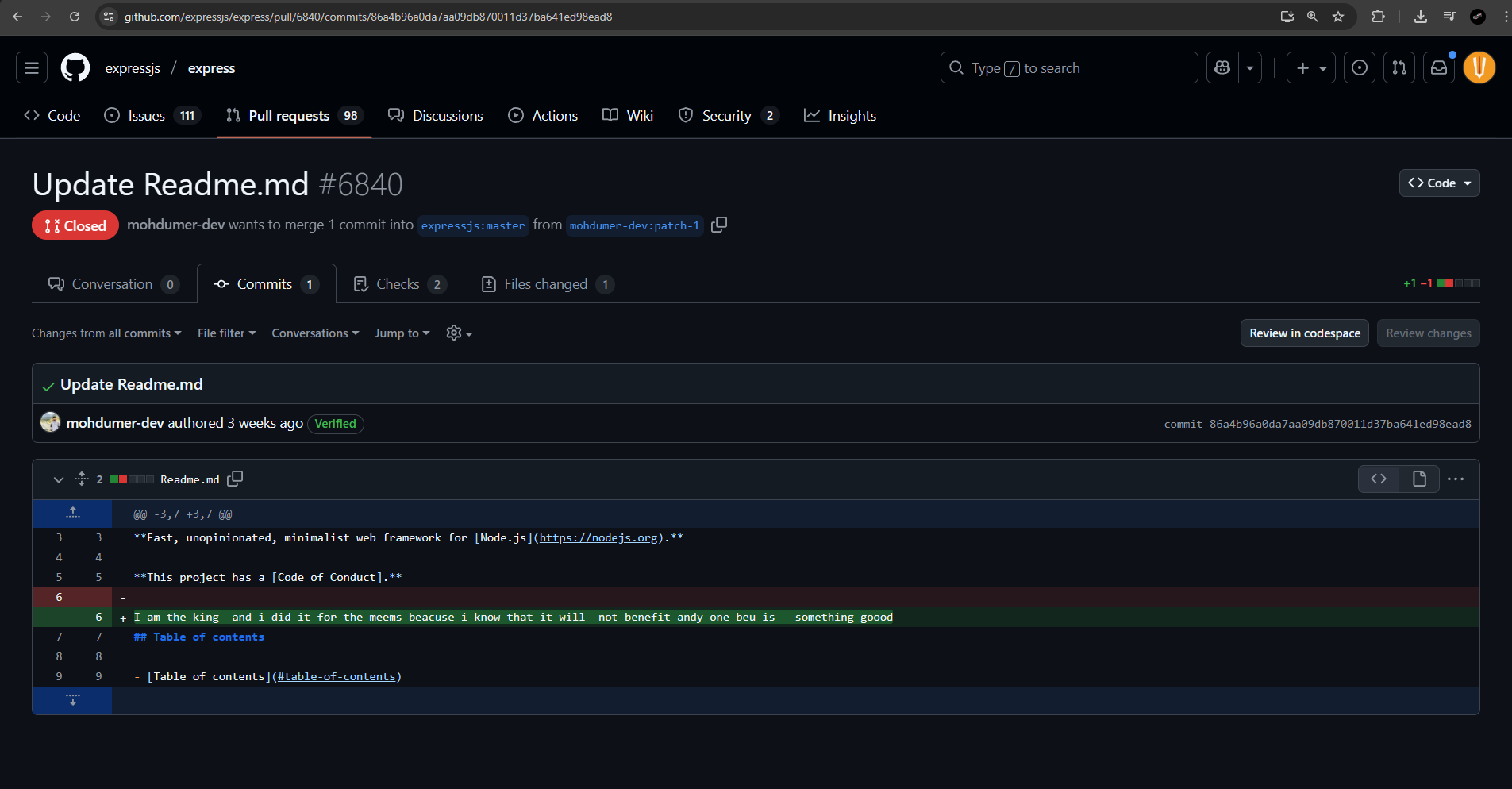
GitHub Express.JS PR Spam by @mohdumer-dev
Link: github.com/expressjs/express/pull/6840/commits/86a4b96a0da7aa09db870011d37ba641ed98ead8
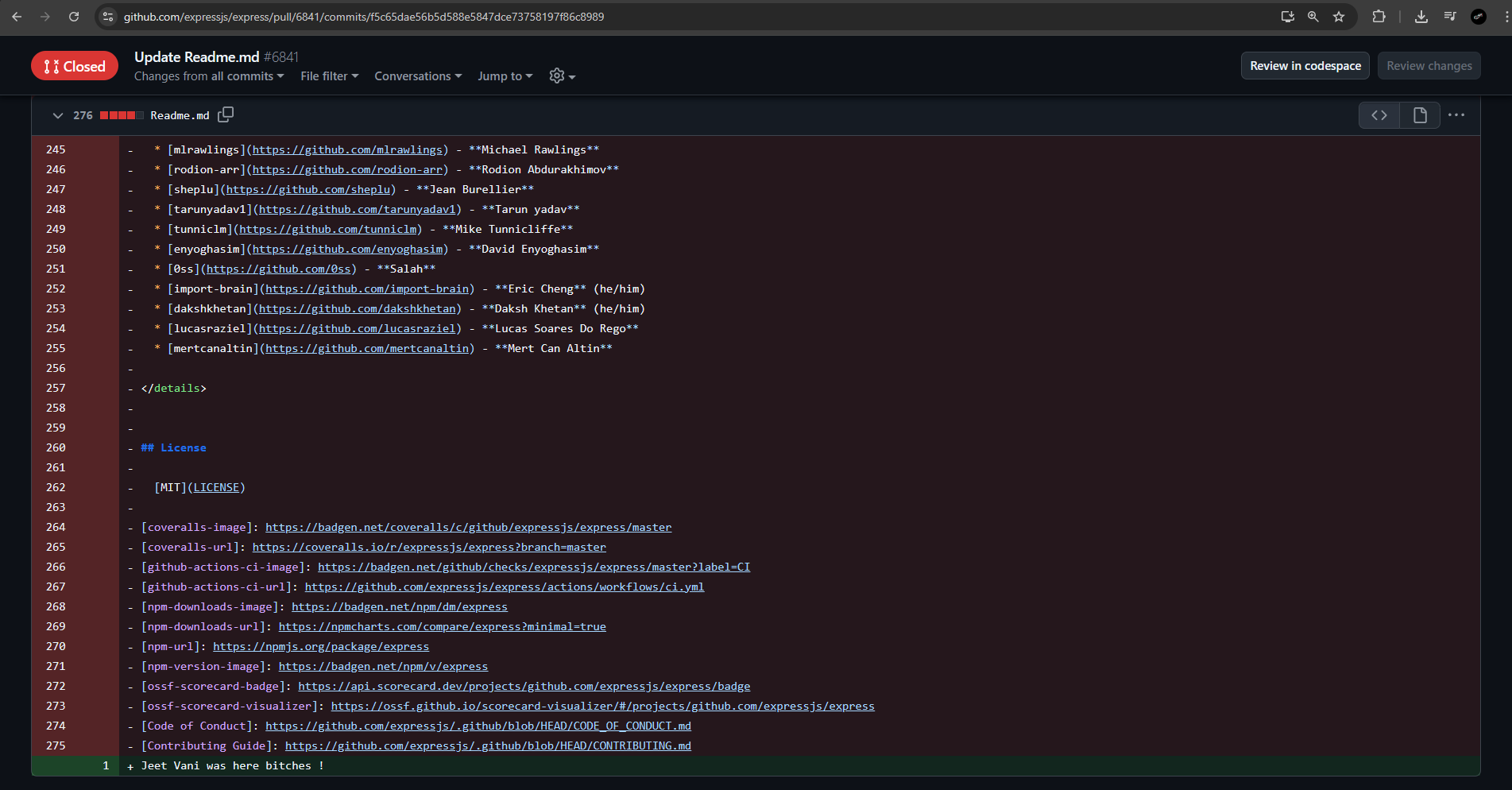
GitHub Express.JS PR Spam by @jeetvani
Link: github.com/expressjs/express/pull/6841/commits/f5c65dae56b5d588e5847dce73758197f86c8989
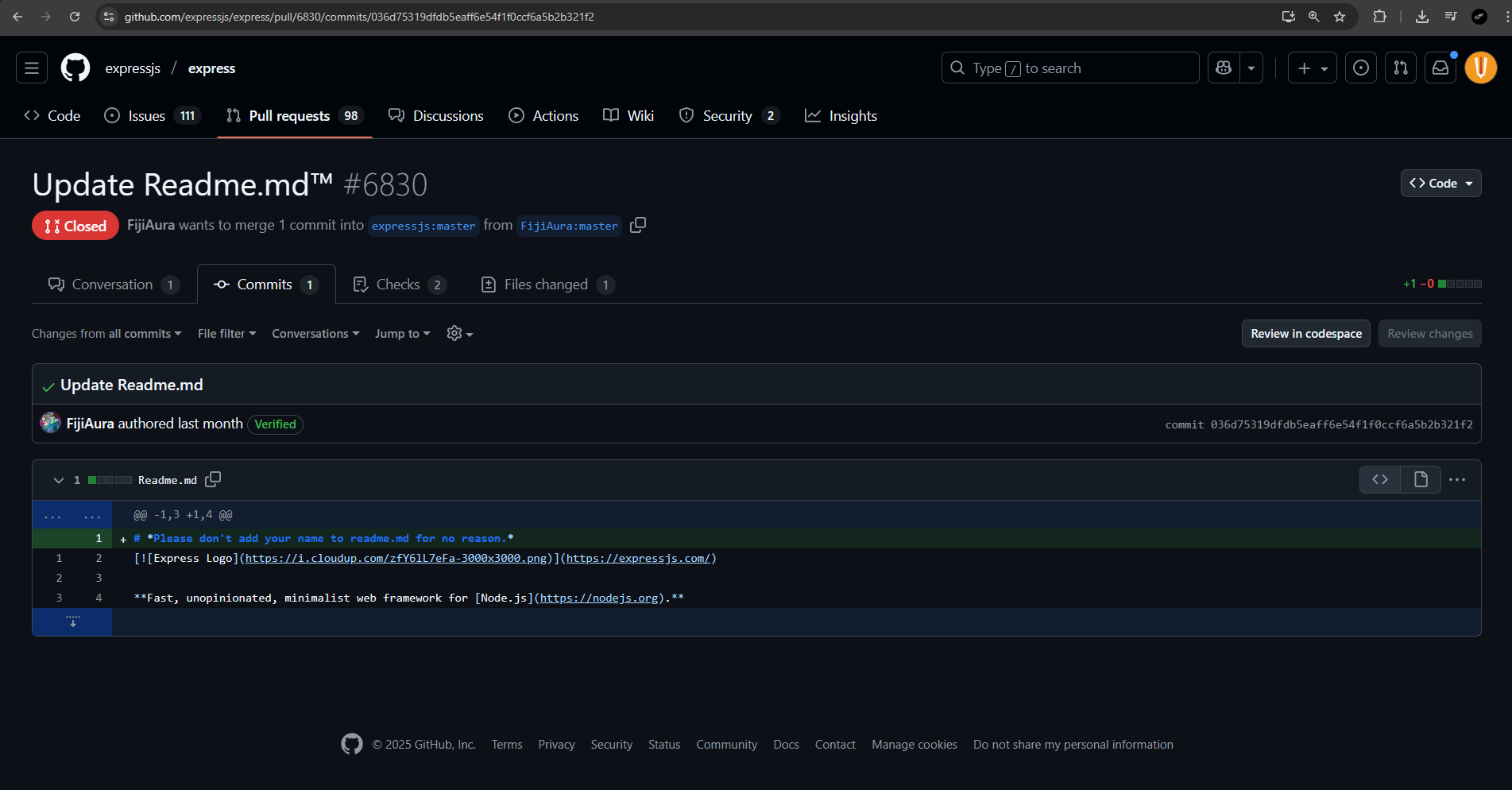
GitHub Express.JS PR Spam by @FijiAura
Link: github.com/expressjs/express/pull/6830/commits/036d75319dfdb5eaff6e54f1f0ccf6a5b2b321f2
The Tutorial That Broke the Open Source Software (OSS)
Somewhere in the vast expanse of YouTube, there exists a coding tutorial with 5.6 million views. FIVE. POINT. SIX. MILLION. For context, that's roughly the population of Finland, except Finland has universal healthcare and this tutorial gave us universal README spam.
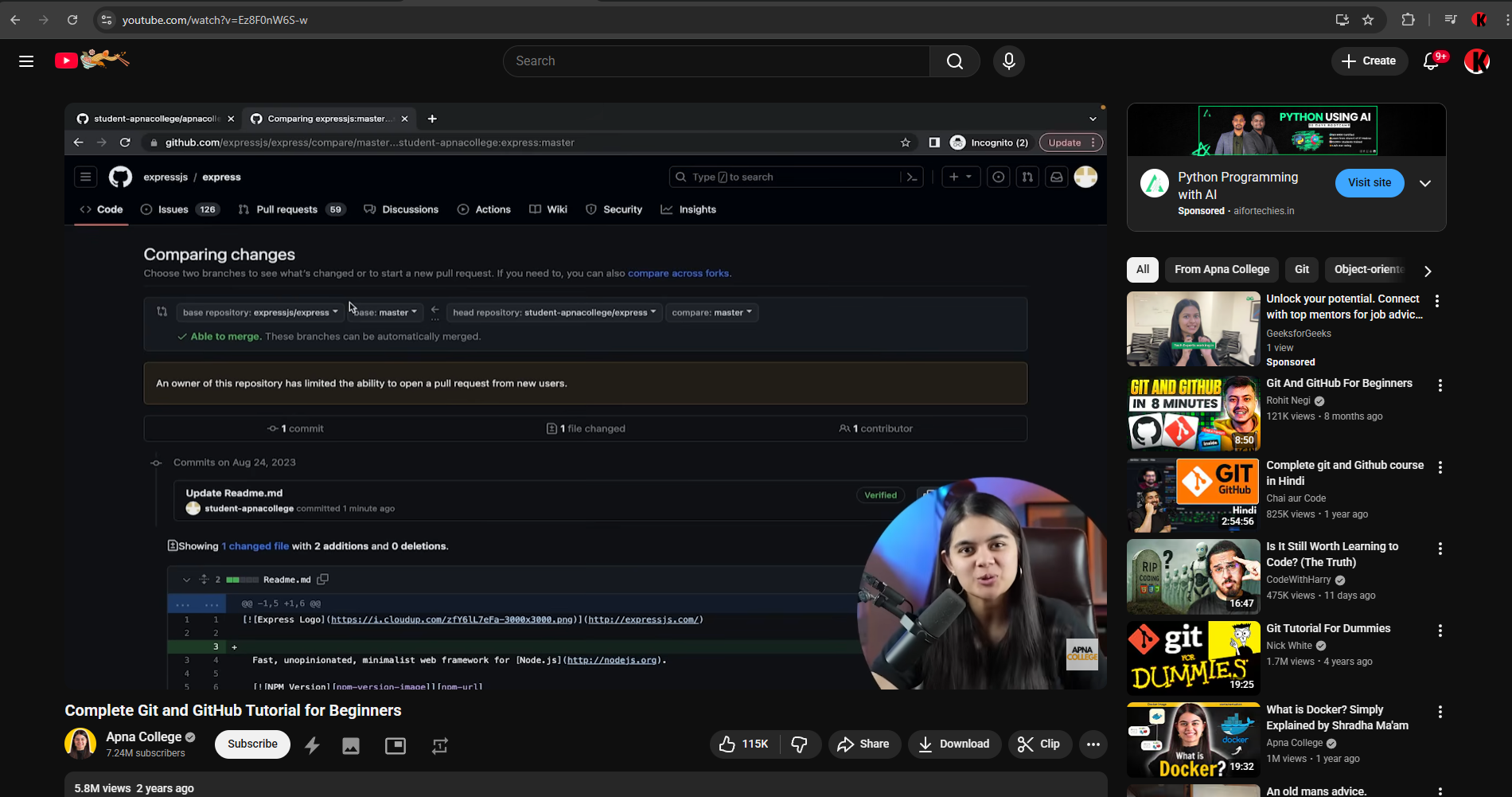
01:13:04 - Complete Git and GitHub Tutorial for Beginners by Apna College | YouTube
When Excuses Comes After You've
Already Burned Down The Repository
Here's where it gets spicy. When the internet finally dragged Apna College into the spotlight, their response was... chef's kiss of deflection:
In reference to our Git tutorial, any Hindi-speaker will understand that at 1hr 13 min we used an example to tell learners NOT to do this 'bad open-source practice'. The PR was NEVER created in the tutorial and clearly told viewers repeatedly for the next 35 seconds (01:14:03 to 01:14:39) not to create a useless PR for updating the README.md. We assume some missed this part :) We hope this clears up any confusion. Apna College's comment on YouTube
Oh, they assume some missed this part. With a smiley face. How delightfully passive-aggressive. You spent an hour building up to this moment. You showed every single step in excruciating detail how to fork, how to edit, how to commit, how to push. The dopamine hit was RIGHT THERE. And then, after showing the entire process, you spent 35 seconds saying "but don't actually do this."

Bait or Mental Retardation Call It.
Desperate Junior Developers don't ask "How can I provide value to Open Source Software?" but they ask "What's the fastest path to a green square on my GitHub profile?"
The Cargo Cult of Open Source Softwares
There's a beautiful concept called "cargo culting." Doing something because you saw successful people do it, without understanding why. During WWII, Pacific islanders saw planes bringing cargo to military bases. After the war, they built fake runways and bamboo control towers, hoping planes would return. Spoiler: they didn't.
New developers see senior engineers with impressive GitHub profiles full of contributions to major projects. They think: "I'll do that too!" But they're building bamboo runways. They're mimicking the appearance of contribution without understanding that the actual value lies in solving real problems, fixing real bugs, and improving codebases. Adding your name to a README.md isn't contributing. But it's like a graffiti. Very polite, well-formatted graffiti, but graffiti nonetheless.
The Maintainer's Nightmare
Let's talk about the real victims: the Maintainers of Open Source Softwares who keep half the internet running on their weekends. These people aren't getting paid to review your PR. They are not your personal job placement officers. They're skilled engineers who donate their time to keep critical infrastructure alive, and instead of spending that time fixing actual issues, they're playing whack-a-mole with spam PRs. Imagine being a surgeon and having to sort through 50 people who walked into the ER to ask if they can add their name to the patient intake form "for experience." That's the level of absurdity we're operating at.
The Reputation Crisis Nobody Wants to Talk About
Here's the uncomfortable truth: This mass spam is creating bias. When maintainers see a flood of low-quality contributions predominantly from one region, unconscious patterns form. It's not fair, it's not right, but it's human psychology. Brilliant Indian developers who are actually making meaningful contributions now have to work twice as hard to overcome the skepticism created by the README.md spam brigade. It's the tragedy of the commons, except the commons is GitHub and we're running out of goodwill.
The Hard Truth About Shortcuts
You know why senior developers tell you to "just learn the basics bro" and "just build projects man" and "read the documentation"? Because there's no shortcut. None. The person who told you otherwise was lying to get views and ad revenue. Every senior developer you admire spent years debugging weird errors at 2 AM, reading documentation that made no sense, breaking things repeatedly, and slowly building actual skills. They didn't hack the system. They did the work. The GitHub contribution graph is a side effect of learning, not the goal. It's like weight loss. If you focus on the number on the scale rather than building healthy habits, you'll yo-yo and fail. Focus on building skills, on understanding systems, on providing value. The green squares will follow.
The Bottom Line
OPEN SOURCE SOFTWARE (OSS) IS A GIFT ECONOMY. You provide value, you gain reputation. You gain reputation, doors open. But you can't fake value any more than you can fake experience. The README spam crisis isn't just annoying. It's a symptom of a broken approach to learning and career development. It's cargo cult programming at its worst, and it's hurting everyone involved. So here's the deal: Delete that tutorial from your watch history. Close that PR adding your name to React's README. And instead, go build something. Break something. Fix something. Learn something real. That's the way. The only way. And for the fucking love of Linus Torvalds, leave the README.md files alone.
Abbreviations
| Abbreviations | Full Form |
|---|---|
| OSS | Open Source Software |
| PR | Pull Request |
| MD | MarkDown File |
| GH | GitHub |
| JS | JavaScript |
| ER | Emergency Room |
| P.S. | PostScript |
| P.P.S. | PostPostScript |
The logos used in this article are registered trademarks of their respective owners. They are included for informational purposes only, and no affiliation or endorsement is implied.
- The GitHub logo is a registered trademark of GitHub, Inc..
- The Open Source logo is a registered trademark of Open Source Initiative (OSI).
All trademarks, logos, and brand names mentioned in this article belong to their respective owners.
Inside The Open Source Softwares (OSS) PRs Massacre of GitHub by Kush Creates is licensed under Creative Commons Attribution 4.0 International
- Table Of Contents:
- Start
- Introduction
- Crime Scene
- The Tutorial That Broke the Open Source Software (OSS)
- When Excuses Comes After You've Already Burned Down The Repository
- The Cargo Cult of Open Source Softwares
- The Maintainer's Nightmare
- The Reputation Crisis Nobody Wants to Talk About
- The Hard Truth About Shortcuts
- The Bottom Line
- Abbrevations
